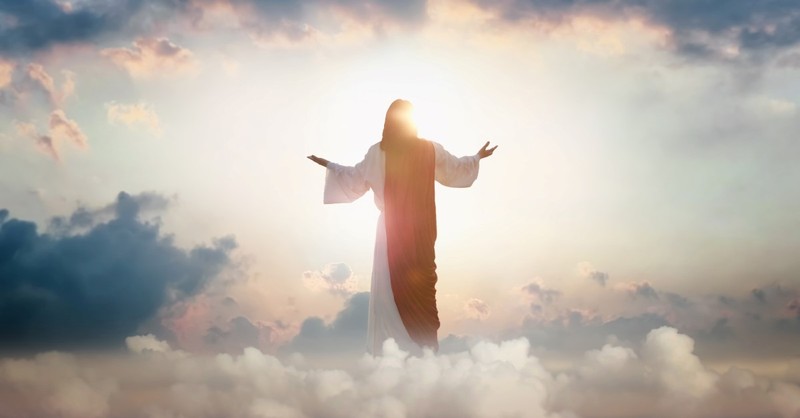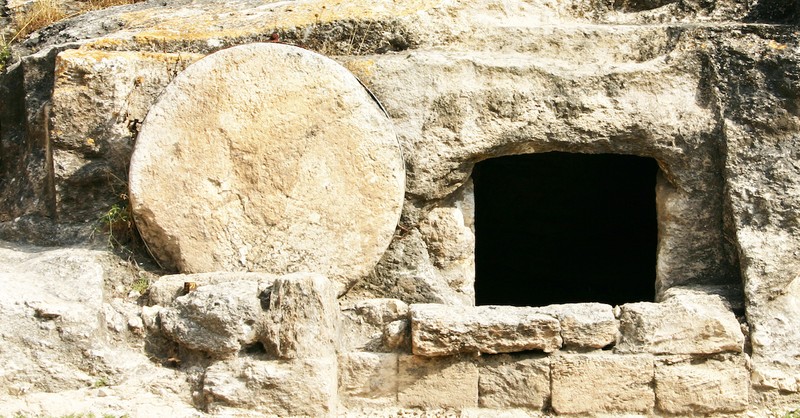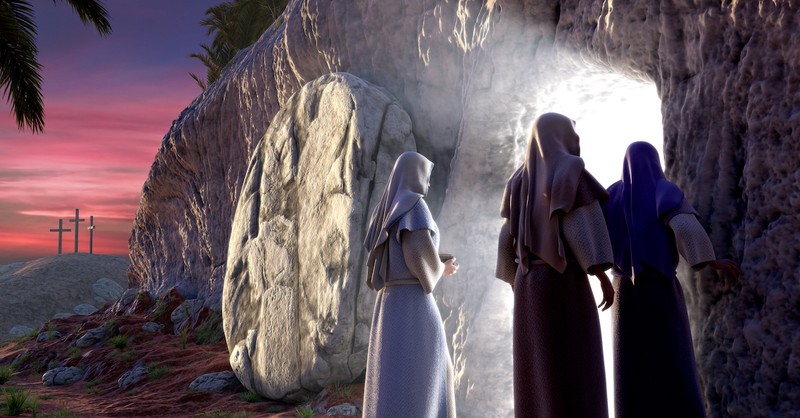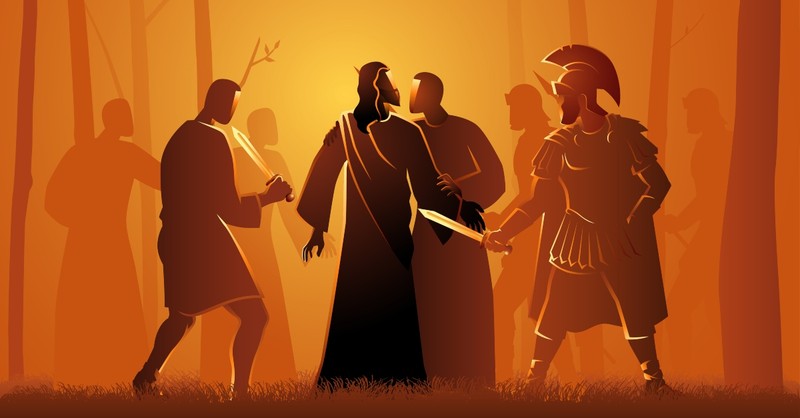
Kids say the darndest things, don't they? They are filled with endless (and often precious) questions, sometimes leaving adults stumped and even clueless about how to respond. As a former kindergarten teacher, when those inquiring little minds came to me with those "precious" questions, I would often say something along the lines of, "That's a great question; let's go discover it together." It usually led us on an adventure to hunt for the answer. Or if there was little to no time for that, they may have received an extra homework assignment where they were to find an answer and let me know (wink, wink).
With Easter coming up and the solemn story of Jesus' life and death and the hope it brings on resurrection Sunday, you may find your little darlings filled with questions. After all, it is the most important event in all of history and comes with some rather tough circumstances to digest, even for adults.
So, how do we address this? How do we answer these questions that come with a tender heart and earnest desire to know about the Easter story, yet at the same time, can prove so difficult to understand? First, be open and transparent. If you don't have the answer, that's okay, but allow that to be a springboard to dig into it together in order to find out. Secondly, if you are unsure how to answer their question in an age-appropriate manner, lift your heart up to the Lord and seek His guidance, then dig into His Word to seek His infinite wisdom. In other words, it's always okay to say, "You know what…I don't know, but God does! So let me pray about it (and you can pray too), and then let's talk about it tonight or tomorrow."
Now, with that, let's hop right to it (no pun intended) and take a look at some of the most asked questions about Easter that generally come up by curious young minds and see how we can go about answering them in a simple yet meaningful way. While some questions may be heartfelt, others may be downright funny, but as parents, it can provide a beautiful opportunity to bond with your little people!
Photo credit: ©GettyImages/PeopleImages

1. Why Did Jesus Have to Die?
This is such a genuine question, and while not an easy one to answer, it is definitely one that needs to be discussed, especially around Easter time. As parents, we can start by explaining that we live in a messy world and do things that don't please God, meaning we sin (Romans 3:23-24). You can share how we all make mistakes and say or do things that make God sad. This is why Jesus came to Earth. He came in human form. We came to declare He is God, to offer us hope and a better way to live. But this was scary to many people. They didn't understand. So, they arrested Him and were very mean, eventually putting Him on a cross to die (Matthew 26: 47-56). As sad as this was, this was all part of God's plan so that we can live with Him forever in heaven (John 3:16). Jesus died in our place to cover all our sins.

2. Why Do We Hide/Decorate Eggs?
This was a tradition that Christians adopted a long time ago (in the late 16th century) when a German priest named Martin Luther held egg hunts at his church for women and children. The egg was a symbol of the empty tomb.
It was also noted that eggs were forbidden to eat during the 40 days before Jesus was placed on the cross (also known as Lent). So, at the end of that time, many would decorate eggs to mark the end of that Lenten period, often coloring them in red to symbolize the blood Jesus shed for us on the cross.
Photo credit: ©GettyImages/DGLimages

3. If Jesus Is Alive, Why Isn't He Still Here?
Before Jesus died on the cross, He told His disciples that He wouldn't be with them much longer (John 7:33). However, He explained to them that through the gift of the Holy Spirit, He would live on in them (2 Corinthians 1:22). We can also have that gift when we profess our faith in Jesus!
So, while Jesus' work here on Earth was done, at least for that moment in time, and He is now seated next to the Father in heaven (Luke 1:26-33), He does promise us that He will return one day. And that is something to look forward to with much anticipation!
Photo credit: ©Getty Images/artplus

4. How Heavy Was the Stone at the Tomb?
Tell them to think about the strongest man they know (or to think about their dad or grandpa). We can explain that the stone was most likely too heavy for them to roll away (Matthew 27:60). Explain that an angel came down from heaven and rolled away the stone (Matthew 28:2). Angels are "special beings" created by God that has mighty powers and abilities. So, it must have been easy for an angel but very hard for a person or even the strongest man!
Photo credit: ©GettyImages/doulos

5. Why Did Jesus Wait for Three Days to Rise Again?
We can always start by saying that God's ways are not our ways, and His ways are higher than our ways (Isaiah 55:8-9). We may not fully understand the nature of God while we live on this Earth, but in God's Word, there are always ways to discover patterns and possible reasons for the things He does! Several numbers in the Bible are repeated over and over to show God's holiness or completion. The number three is one of those numbers, as God is three in one: Father, Son, and Holy Spirit (Matthew 28:19). This could be a possible reason for the three days to rise again.

6. Where Does the Easter Bunny Live?
Oh, this simply sweet (and utterly cute) question gets me every time. The innocence behind it makes me want to giggle, but with a very straight face, this is how I typically answer it. I explain that most bunnies like to live in the woods in little burrows under the ground. So, the Easter Bunny probably hides most of the year in His burrow. However, we can think about how Jesus was hidden away in a tomb for a while (three days), and then He appeared. He was alive, and we celebrate that! So, I think The Easter Bunny likes to show up around Easter to celebrate Jesus, too!

7. What Does Resurrection Mean?
As believers in Jesus, this word gives us so much hope! It tells us that Jesus was raised up from the dead. This may also present a sweet opportunity to share about a loved one that has passed. You can explain and share how this word gives us the hope that we will see our loved ones again and be reunited in heaven. We can also talk about how death may seem scary, but when we know Jesus when we die, we get a new body that never hurts or sins and lives forever. Praise God for that!

8. What Is Holy Week?
We can explain that a week has seven days, so Holy Week is the seven days that lead up to Easter. It starts with Palm Sunday, when Jesus rode into the city on a donkey, and people declared Him as their King. Monday through Thursday, we can discuss the importance of the Last Supper, how Jesus washed the disciples' feet, and how Jesus went to the garden to pray. Good Friday marks the solemn time of observing the meaning of the cross, but we celebrate His resurrection on Sunday. This is Easter!
More Resource for Families:
A Bible Reading Guide for Families to Grow Together This Holy Week
What Is Holy Week? - 8 Days of Easter You Need to Know

9. Why Did Some People Not Like Jesus?
Jesus came to this Earth to show a dark and lost world that He was the Light and source of hope. He taught in the synagogues and drew in a lot of people. However, His teachings didn't always align with the rulers of that time. He also caused a lot of people to get upset because He was teaching them to live a different way than how they wanted to live.
But, the main reason many didn't like Him is because He claimed to be God (Mark 14:61-62, John 10:30 and John 5:58). Due to His perfect holiness and righteousness, it made many uncomfortable, as they were forced to question their own beliefs in God.

10. Why Did Jesus Have to Die on a Cross?
During the days that Jesus walked the Earth, thieves and those who broke the Roman law were put on a cross to die for their sins. It was sad and brought about shame. However, this crucifixion was a common form of punishment that was meant to ridicule and mock the person who was convicted of a crime or made an unlawful choice. So, when the Roman soldiers thought Jesus was causing strife and claiming He was "the Messiah," the cross was a natural form of death.
However, as Christians, the cross holds so much more meaning to us. People may wear a cross around their neck or as a ring on their finger, and they may even have crosses displayed around their house because they remind them that Jesus died for them. Jesus died for you, too. So, when we see a cross, it should be a reminder to "Thank Jesus" for His selfless sacrifice!
In closing, I pray that these questions (and that of the like) allow for tender moments to talk about Jesus with your child. May it open their eyes to Christ's love for them and help them grasp the reason we have both sorrow and joy this Easter season.
Originally published Thursday, 14 March 2024.










